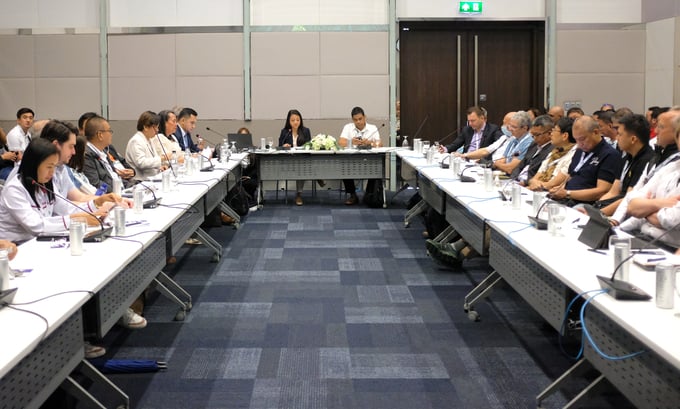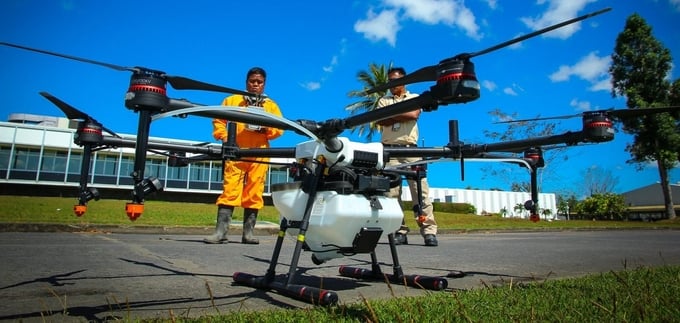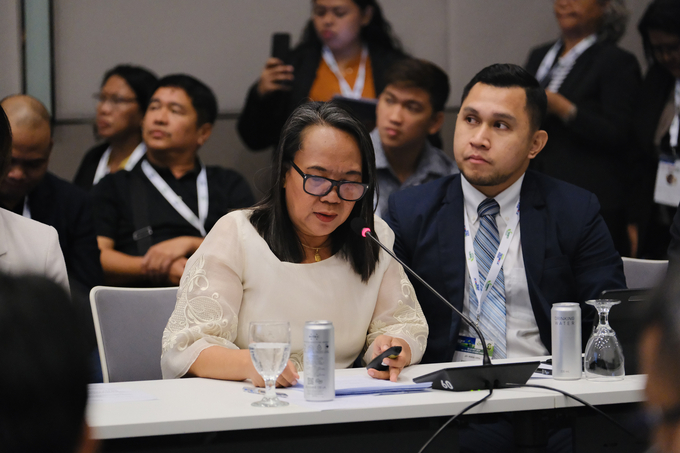June 16, 2025 | 13:04 GMT +7
June 16, 2025 | 13:04 GMT +7
Hotline: 0913.378.918
June 16, 2025 | 13:04 GMT +7
Hotline: 0913.378.918

The roundtable discussion "Strategic dialogue: Advancing agritech and localization prospects in Philippine agriculture" on May 22. Photo: Quynh Chi.
On May 22, within the framework of the Agritechnica Asia & Horti Asia 2014 event, managers from the Philippine Department of Agriculture shared insights about the country's potential at the roundtable discussion titled "Strategic dialogue: Advancing agritech and localization prospects in Philippine agriculture."
Previously, public spending in the Philippines was primarily directed towards price support for certain crops and commodities, as well as subsidies for input costs such as fertilizers and machinery. However, in recent years, the Philippines has continuously implemented numerous policy innovations, creating favorable conditions for the development of the agricultural and fisheries sectors.
The agriculture and fishery sectors have accounted for about 10% of the Philippines' total GDP in recent years. Accordingly, investment in agricultural development is key for the country to accelerate economic recovery post-pandemic, reduce poverty, and achieve inclusive growth. The Philippine government has identified the modernization and industrialization of the agriculture and fisheries sectors as one of its top priorities.
However, these sectors currently face significant challenges due to low productivity, with most production activities being on a small scale. Recent political, social, and environmental changes have also exerted considerable pressure on the Philippines' food production and distribution system, directly affecting food security and nutrition in the country.
In response to these overlapping challenges, the Philippine Department of Agriculture established the Rice Competitiveness Enhancement Fund (RCEF) in 2019. This National Rice Fund aims to improve the competitiveness of Philippine rice on the international stage, increase farmers' incomes, and create favorable conditions for businesses to import rice.

The Rice Competitiveness Enhancement Fund (RCEF) aims to improve the competitiveness of Philippine rice on the international stage. Photo: IRRI.
According to Dionisio Alvindla, Director of the Philippine Center for Postharvest Development and Mechanization (PHilMech), the Rice Fund has completed Phase 1, disbursing $88 million annually to develop agricultural machinery in the Philippines. However, replicating technological solutions remains challenging because most machines are imported, and the country lacks production facilities that meet quality standards.
By 2021, the National Agriculture and Fisheries Modernization Plan (NAFMIP) has opened up a promising future for the entire industry, accelerating the modernization of Philippine agriculture.
The NAFMIP aims to transform Philippine agriculture into a dynamic, high-growth industry. The main goal of the plan is to empower farmers and fishermen, improve their technical skills, and involve them in the country's food system.
Dr. Juana Tapel, Director of the Philippine Bureau of Agriculture and Fisheries Engineering (BAFE), emphasized that the 10-year path to modernize agriculture and fisheries is considered essential, directional, and a national strategy. “This is the government’s call to the private sector, agricultural and fisheries cooperatives, and associations to join hands with the Philippines, contributing to realizing the vision of food security and nutrition, resilience, and prosperity for farmers and fishermen,” she affirmed.
The specific action plan includes goals to diversify production and add value. For instance, the Philippines plans to develop the rice value chain by integrating rice farming with fish and goat farming to maximize agricultural land use, increase income, and diversify food sources. Additionally, the country will develop value-added products such as rice cakes and dried fish, enhancing the value of local agricultural products.

Director of the Philippine Bureau of Agriculture and Fisheries Engineering Juana Tapel speaks at the event. Photo: Quynh Chi.
For the fisheries sector, efforts are being made to create opportunities for enterprises to expand their business activities in urban markets, thereby increasing their access to larger consumer markets. Developing artisanal businesses is also a priority, providing support to fishermen during off-season periods to ensure they have a stable income year-round.
To integrate the goals of food security and nutrition security, the Philippines is promoting the production of vegetables, fruits, and beans to improve public health. Mechanization plays a crucial role in ensuring synchronization between actual production and consumer demand for healthy, nutritious food, thus avoiding surplus and post-harvest losses.
The Philippine Department of Agriculture aims to shorten the distances between stages in the agricultural value chain through mechanization. This approach optimizes local resources, reduces transportation costs, and minimizes losses during transportation by establishing large processing centers near centralized production areas.
By investing in mechanization, promoting diversified agricultural practices, and enhancing value-added production, the country is not only improving the livelihoods of farmers and fishermen but also ensuring food security and nutrition for its population. The ongoing modernization efforts, supported by comprehensive policies and collaboration with the private sector, underscore the Philippines' commitment to building a resilient and prosperous agricultural sector that can drive sustainable economic growth in the years to come.
Translated by Quynh Chi

(VAN) Extensive licensing requirements raise concerns about intellectual property theft.

(VAN) As of Friday, a salmonella outbreak linked to a California egg producer had sickened at least 79 people. Of the infected people, 21 hospitalizations were reported, U.S. health officials said.

(VAN) With the war ongoing, many Ukrainian farmers and rural farming families face limited access to their land due to mines and lack the financial resources to purchase needed agricultural inputs.

(VAN) Vikas Rambal has quietly built a $5 billion business empire in manufacturing, property and solar, and catapulted onto the Rich List.

(VAN) Available cropland now at less than five percent, according to latest geospatial assessment from FAO and UNOSAT.

(VAN) Alt Carbon has raised $12 million in a seed round as it plans to scale its carbon dioxide removal work in the South Asian nation.

(VAN) Attempts to bring down the price of the Japanese staple have had little effect amid a cost-of-living crisis.